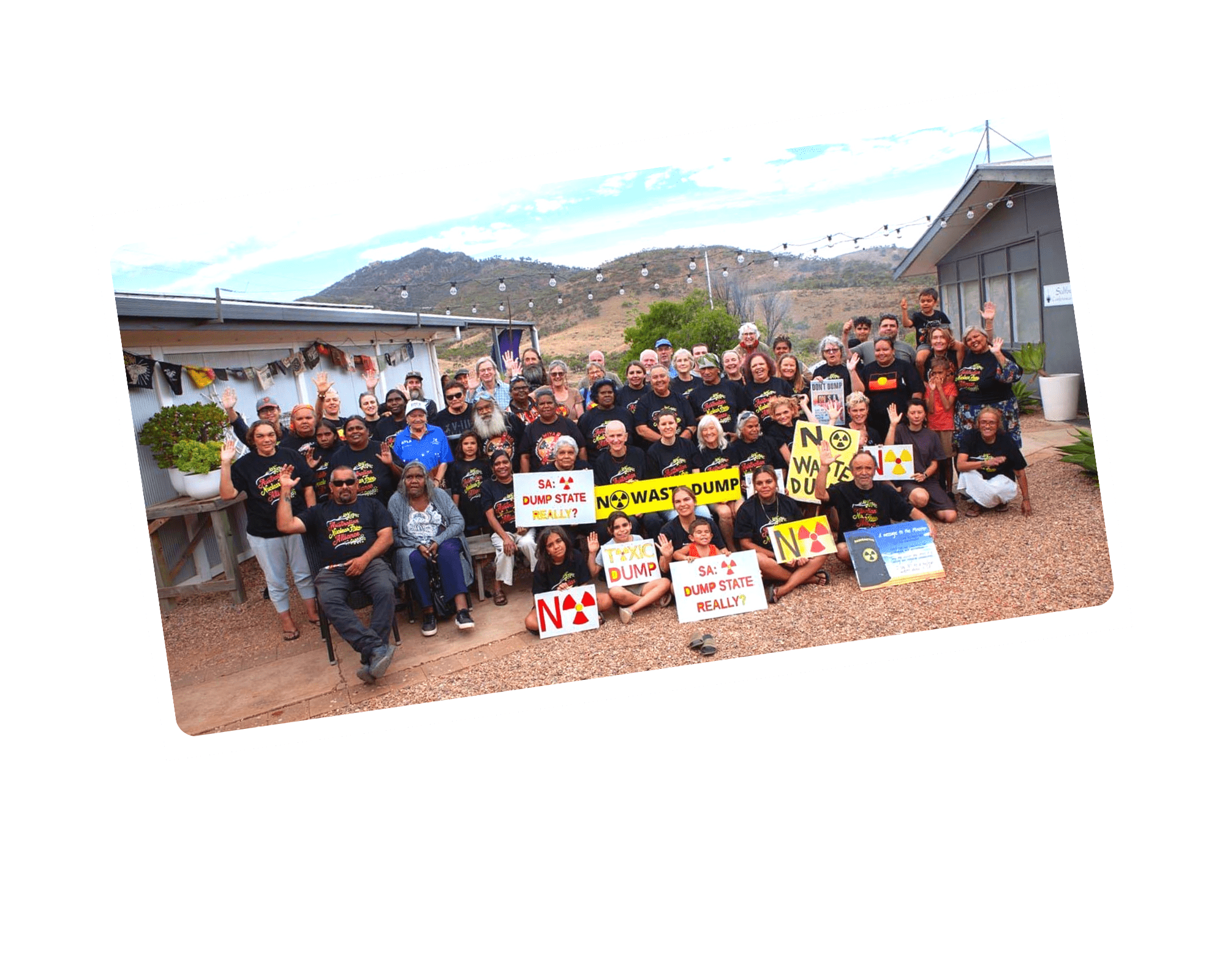Nuclear Chain
MAPW works to prevent the harms caused by the nuclear chain: uranium mining, nuclear power, and nuclear waste.
Nuclear Waste
MAPW advocates for an independent review of nuclear waste disposal.

Australia urgently needs an independent review of the production and disposal of long-lived intermediate level nuclear waste (ILW), which must be kept isolated from people and the environment for 10,000 years.
A review is necessary in order to develop a long-term plan that avoids double-handling and unnecessary movement of radioactive materials, and meets world’s best practice standards – including standards for consultation with communities affected by radioactive waste disposal.
Cleaner, safer and more reliable cyclotron nuclear medicine manufacture should be developed and deployed as a priority.
Australia’s acquisition of naval nuclear reactors under the AUKUS agreement will also generate nuclear waste.
The National Radioactive Waste Management Amendment (Site Specification, Community Fund and Other Measures) Bill 2020 sought to legislate the establishment of national radioactive waste facility near Kimba, on Barngarla land in regional South Australia.
MAPW assessed the plan to establish the facility to be flawed.
The government information campaign was also misleading, with inaccurate information about risks and benefits, inflated employment promises, and poor processes to assess genuine community views. This may represent a contravention of United Nations Declaration on the Rights of Indigenous Peoples principles of free, prior and informed consent.
Additionally, the Minister responsible for the project unsuccessfully sought to formally remove the right of legal challenge from the site selection process, further violating the rights of Barngarla Native Title holders.
In August 2023, the Barngarla people successfully challenged the decision to locate the dump on their land. The Federal Court found there had been apprehended bias in the decision-making process.
Taking Action
MAPW was a vocal critic of the plan and process for the proposed National Radioactive Waste Management Facility in Kimba, SA.
MAPW continues to work to:
- Educate the public and decision-makers about nuclear waste
- Educate the medical community about nuclear waste and nuclear medicine
- Support Native Title Holders’ opposition to nuclear waste
- Promote cyclotron nuclear medicine manufacture
News: Nuclear Chain
Subscribe to stay in touch with MAPW people, news, actions and events.
"*" indicates required fields
Australian Submarine Agency’s credibility called into question
Documented false claims by the Australian Submarine Agency (ASA) about nuclear waste at the Stirling Naval Base were last night denied point blank in a public consultation forum.
Read MoreChernobyl: Act on Evidence, Learn from the Past
Marking 39 years since the Chernobyl nuclear disaster, Tilman Ruff reflects on hubris, vested interests - and wilful denial of science.
Read MoreFukushima Never Here: Watch
Watch a recording of the Don't Nuke the Climate webinar on the risks and on the implications of nuclear accidents.
Read MoreRemembering Fukushima: events, new research
Events around the country and online will mark 14 years since the Fukushima nuclear disaster.
Read MoreWatch Now: The Coalition’s nuclear plan
MAPW joins Don't Nuke the Climate for a webinar on the Coalition's nuclear plan and its implications in a climate change scenario.
Read MoreParliamentary Briefing: Nuclear and Health
MAPW, DEA and PHAA have briefed parliamentarians on the health risks of nuclear power.
Read MoreTerritory Coordinator Bill should be Rejected
In a series of submissions on proposed legislation, MAPW has highlighted the potential impacts on the handling and storage of nuclear waste.
Read MoreWhere is the ‘mature debate’ on radiation?
The Canberra Times runs our VP's piece on the known risks of nuclear.
Read MoreA healthy future is renewable, not radioactive
Our VP has testified to the health risks associated with nuclear power.
Read MoreNuclear Power
Nuclear power is not the solution to Australia's energy and climate crisis.
Australia’s energy future is renewable, not radioactive.
Nuclear power:
- Is inextricably associated with production of nuclear weapons
- Is carbon-intensive in nearly all stages of its operation
- Produces intractable highly toxic waste
- Is far too slow to implement
- Is vulnerable to catastrophic accidents and sabotage
- Requires large amounts of our most precious resource – water
- Has major health implications for populations living near its facilities
- Is prohibitively expensive
- Is unnecessary, given the rapid expansion of renewable energy sources.
There are clear historical links between the nuclear industry and nuclear weapons proliferation: civil nuclear power generation goes a long way to providing a nuclear weapons capability. All nuclear armed states have used facilities and/or fuel that were ostensibly for peaceful purposes for their weapons programs.
Proposals for Australia to acquire nuclear power – when we have other cheaper and less risky energy options – may undermine confidence in Australia’s commitment to non-proliferation.
Australia’s known uranium resources are the world’s largest – almost one-third of the world total.
Australia is bound by international treaties, conventions, and agreements related to uranium mining and exports. These include safeguards to make sure Australian uranium is used only for peaceful – and not military – uses.
Mining interests seek to remove these safeguards, while rapidly expanding uranium mining.
Uranium mining is dirty and dangerous, with significant health risks for people and the environment. Mines like Rum Jungle, in the Northern Territory, have not been safely rehabilitated after more than 50 years – and many millions of taxpayer dollars.
Find more information about MAPW’s work on uranium in the Library. For more resources on uranium issues, visit Friends of the Earth.
Uranium Mining
MAPW has a longstanding policy of opposition to uranium mining.
We work to:
- Preserve and strengthen nuclear safeguards
- Oppose uranium mine approvals and expansions
- Educate the public about health effects of the nuclear chain
- Amplify Indigenous voices on the issue, and support Traditional Owners
- Strengthen national nuclear-free networks